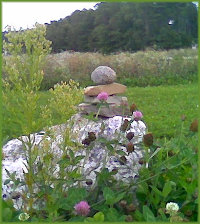Phases of the Moon, the newsletter of the Maine NVC Network
Issue Three: Restorative Circles
Our newsletter appears once a month around the time of the new moon. Our purpose is to contribute to the NVC learning of people who have taken at least an NVC Level 1 workshop, and help us stay connected as we endeavor to deepen a culture of peace within ourselves, our families and the world. We believe a Level 1 offers so many new ways of thinking that additional support for learning and integration could be helpful.
We endeavor to make each edition informative, connecting, inspiring and fun. Please let us know how the newsletter might contribute to your NVC well-being.
The theme for this issue is RESTORATIVE CIRCLES, an innovative application of NVC begun by Dominic Barter in Brazil, and now spreading to many parts of the world, including Maine.
Contents
- Feature: Restoring Community Well-being, by Peggy Smith, CNVC certified NVC trainer
 Guest Article: Community Partners and Restorative Circles,
Guest Article: Community Partners and Restorative Circles,
by Brenda Mitchell, Director of Operations, CPI- Poetry Corner: Joy For No Reason, Danna Faulds
- Celebrations
- Crossword
- Announcements
Restoring Community Well-being
by Peggy Smith, CNVC certified NVC trainer
There is interesting NVC work being done in Brazil to restore wellbeing in communities. In the past decade, Dominic Barter, a certified NVC trainer, has created a process to contribute to the wellbeing of his community by working with the juvenile justice system. He uses the NVC principles of connection and empathy to bring a re-humanizing process - Restorative Circles (RC) - to situations in which harm has affected the community.
RC is straightforward, easily explained, and accessible to people with no previous familiarity with NVC. RC has been so effective that the Brazilian government and UNESCO are replicating Dominic’s model in other areas of Brazil. It is now being used in the juvenile justice system, as part of restorative discipline systems in schools, and in local community programs that respond to violence.
The RC process is set up so that after initial training, each organization can develop its own internal facilitators. RC is designed to be a low cost, effective way of shifting our societal relationship to conflict. What NVC dialogue can do between two people, Restorative Circles can do for families, groups, organizations, businesses and communities. When some harm has been done, these circles can help all affected move forward grounded in the full humanity of both themselves and the others involved.
Each Restorative Circle
|
This particular type of restorative justice is now being brought to North America. In March 2009, several people from Maine went to Montreal to attend RC trainings with Dominic Barter. In the summer of 2009 the Peace & Reconciliation Studies Department of University of Maine offered an RC course. There is now a group of 14 people who are meeting monthly to practice the skills of RC facilitation. Community Partners, Inc. (CPI), a non-profit based in Biddeford, ME, has incorporated NVC and Dominic’s Restorative Circles into their business model for management, employees, and clients. With more than 400 employees, CPI is institutionalizing RC to help staff and clients reframe conflict from an experience that leads to pain and separation to an experience where each person’s humanity is seen more deeply by others, leading to deeper connection. Personally, I found participating in even an RC practice circle about an issue that arose 15 years ago created such a shift in me. I now have a more open, connected feeling both toward myself and toward the other people involved in the original incident. I picked a situation where I have long told myself that I was "at fault" for "hurting someone’s feelings" thereby creating a lot of disharmony. For a long time I had stuffed down feelings of shame and embarrassment about what had happened. Sometimes these feelings expressed themselves as aloofness and created even more disconnecting interactions between myself and the others involved. During a Restorative Circle practice session, I offered to work on the scenario. Part of the time I "played" myself (the author of the event), and part of the time I "played" the other person (the receiver of the event). Others got to experience facilitating the three components of the process (see box at left). As a member of the circle I had the opportunity to receive empathy for my part in the situation, which resulted in feeling greater connection for all the others involved in the original incident. Dominic calls this sharing meaning. Currently, in Quebec, Gina Cenciose and others are starting a Restorative Circles Family Network. People will come together to learn the process and then be available to facilitate circles for families in the network when conflicts arise. The joining of NVC with restorative justice work is innovative. To support the growing interest in RC in Maine, we will be offering a 2-day Restorative Circles training April 20 & 21, 2010. FMI |
Peggy Smith is co-founder of the Maine NVC Network and founder/principle trainer with Open Communication
Contact Open Communication for an RC presentation for your organization or business.
There are many forms of restorative practices coming into our communities. They can be part of a restorative discipline program within a school or part of the judicial system.
To learn more
- about Restorative Justice in general:
- about Dominic Barter’s work:
- An article giving some background & history of Dominic's work in Brazil
- Dominic's website: blog entries and videos
~ ~ ~ ~ ~ ~ ~ ~ ~ ~ ~ ~ ~ ~ ~ ~ ~ ~ ~ ~ ~ ~ ~ ~ ~ ~ ~ ~ ~ ~ ~ ~
~ ~ ~ ~ ~ ~ ~ ~ ~ ~ ~ ~ ~ ~ ~ ~ ~ ~ ~ ~ ~ ~ ~ ~ ~ ~ ~ ~ ~ ~ ~ ~
Community Partners Inc.,
|
Crossword PuzzleThis is a fully interactive online puzzle; we will have a new one each month which relates to the issue's theme. 2010 Maine NVC Integration Program
|
Learning through Conflict: An Introduction to Restorative Circles
with Gina Cenciose, close colleague and student of Dominic Barter,
founder of Restorative Circles
In this 2 day workshop you will be introduced to Restorative Circles and have an opportunity to experience and practice its unique dialogue process.Day One:
- Identify the key components of a conscious, systemic response to conflict and see how that system leads to effective, sustainable solutions developed by those most affected
- Learn how to structure a dialogue process in which respect, empathy and understanding are the hallmarks
- Experience the difference between self-expression and the deeper form of connection that leads to understanding of another.
- Practice hearing the deeper meaning of what is said and done by those in the Circle
- Discover the benefits of RC and how those benefits relate to enhanced community connection, safety and social cohesion
- Practice a dialogue process that enables you/your group to transcend enemy images of the other by hearing the humanity within the painful choices that the other person/ group has made.
- Begin practicing some of the facilitator skills required to support a Restorative Circle
- Participate in a simulated Circle to experience the power of empathy that this process engenders
- Learn the five steps to setting up an effective Restorative System and begin exploring the application of this new resource in your family, work, school, community, etc.



